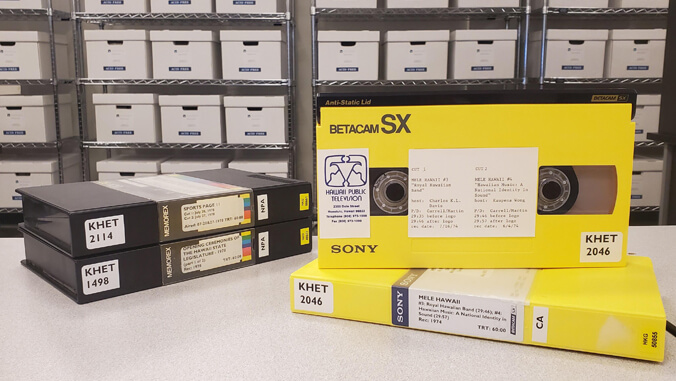
ʻUluʻulu: The Henry Kuʻualoha Giugni Moving Image Archive of Hawaiʻi at the University of Hawaiʻi–West Oʻahu is part of a nationwide effort to digitize and preserve historic publicly funded radio and television programs across America, including PBS Hawaiʻi.
The project, American Archive of Public Broadcasting (AAPB), is a collaboration between the Library of Congress, WGBH in Boston and participating organizations across the country who care for archival public media.
“I’m so proud that the programs from PBS Hawaiʻi archived at ʻUluʻulu will soon be available to watch online through the American Archive of Public Broadcasting website,” said Janel Quirante, ʻUluʻulu head archivist. “The footage will be in good company with other public media icons like Julia Child and Mr. Rogers!”
ʻUluʻulu, Hawaiʻi’s official state archive for moving images, is coordinating the digitization and description of 2,000 films and videotapes from the PBS Hawaiʻi collection. The entire digitization project is expected to be completed by the end of the year.
The digitized programs will be made publicly available through ʻUluʻulu‘s online catalog and the AAPB website. The digital preservation masters will be stored at ʻUluʻulu and at the Library of Congress.
“We are in the business of preserving analog media—ensuring that these films and videotapes are carefully maintained, digitized, and made accessible to the public,” said ʻUluʻulu Collections Specialist and Producer Heather H. Giugni. “It is partnerships and opportunities like these that make our mission possible.”
ʻUluʻulu received the PBS Hawaiʻi collection in 2016, and the tapes are physically stored in a vault on campus. Over the years, ʻUluʻulu has been able to digitize portions of this collection through various grant funding. The new project will enable the digitization of the remaining videotapes, with the help of WGBH and a preservation laboratory in Pennsylvania.
Read more at Ka Puna o Kaloʻi.
—by Zenaida Serrano Arvman

